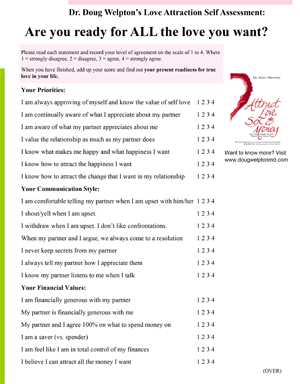Introduction to Attract Love, Intimacy & Money: Use Your Mind to Get What You Want
I have written this book to help you change your life and your relationships as rapidly as possible. This book is based on the lessons I have learned, most of them the hard way. My book is the guide I wish someone had given me more than thirty years ago. I would not have had to make so many mistakes.
I had to learn to stop keeping score, for example, and to stop blaming and instead be totally self-responsible. I had to learn to change myself instead of trying to change my partner, or anyone else. When we do change for the better we attract our partner and others to want to change like we have. We don’t change them by trying to change them. Like all of us they resist.
Let me give you a quick example. Dave and Jen consulted me because their relationship was deteriorating.
Dave complained: “I can’t make Jen happy. No matter how hard I try she’s unhappy. In fact, the harder I try the unhappier she gets!”
“You’re right,” I said, “you can’t make Jen happy. It’s not your job. You can’t make another person happy no matter how much you love them. Abe Lincoln wisely observed, ‘Most people are as happy as they make up their minds to be.'”
“You mean it’s up to Jen to choose to be happy?” Dave asked.
“Yes,” I replied, “Happiness is a choice. Each of us chooses for ourselves. We make the choice to be happy regardless of conditions and circumstances, not because of them.”
Dave got it. He stopped trying to make Jen happy.
Guess what happened? Jen got happier! What’s more, she thanked Dave for respecting her to be in charge of her own moods.
Dave and Jen are an example of how our dysfunctional beliefs get us into power struggles and cripple our relationships. When we understand our mistaken mindsets we can change our marriages quickly.
Buy the book and begin to change now.
Chapter Review
If you have a partner and you decide to work together with this book and make your work a joint project, it will benefit you both and usually speed up changes in your relationship. You may still proceed at different speeds, and you will inevitably work in different ways just because you are two different people.
Some of you may decide it would work best for you to share your work with a good friend, someone with whom you feel safe and who may want to share their work with you too. It’s helpful to share your new awareness with someone you trust. You gain the benefit of added input from another person’s perspective. Another possibility is to do this work with a coach who will assist you by following up on the questions at the end of each chapter and will support you in your growth. Some people may choose to seek a therapist for this process and that works too.
It can also be helpful to form a small group. Generally I recommend eight people maximum. In such a group, people work together for the benefit of each member, and the shared intelligence of the group contributes to each person’s growth. You need to follow whichever of these ways works best for you, something only you will know. No matter which approach you choose, something exciting will happen in your life and in your relationships.
Being Sensitive to Criticism:
I have become aware of my excessive sensitivity to criticism. In the past, I would allow one critical remark to cancel ten compliments. Occasionally, it struck me there was something decidedly irrational in my placing so much more weight on criticism than on praise. My thinking was skewed. I even believed that whoever was criticizing me was expressing truth, whereas those who were praising me were just trying to make me feel good.
I related my thinking to my parents’ model for raising children, which was to use criticism as a method to prod me and my siblings toward perfection. They were stingy with their praise. I grew up trying to please them by doing everything right just to avoid criticism. When I was criticized, I took it to heart. Now, when I reflect on this behavior, I realize it would have been much better for me had I just reversed my internal process by putting ten times more weight on each compliment than on one criticism ! While growing up, I was unable to do that.
From the beginning of my relationship with Mary Elizabeth, I felt her approval, which made me feel good about myself. I found her outgoing, sunny disposition and her laughter infectiously affirming. However, I did not recognize that subconsciously, I began to expect her to make me feel approving of myself. Her good opinion flowed into and over me and made me feel so supported, that I was oblivious to how much I expected her to help me achieve those good feelings on a regular basis. I’m not likely the only person who has harbored such expectations of a spouse, but it required an inner search on my part to realize not only that I had this expectation, but that it also had a cost. The cost was the pain I felt when the two of us were out of sorts, and I did not feel her approval.


